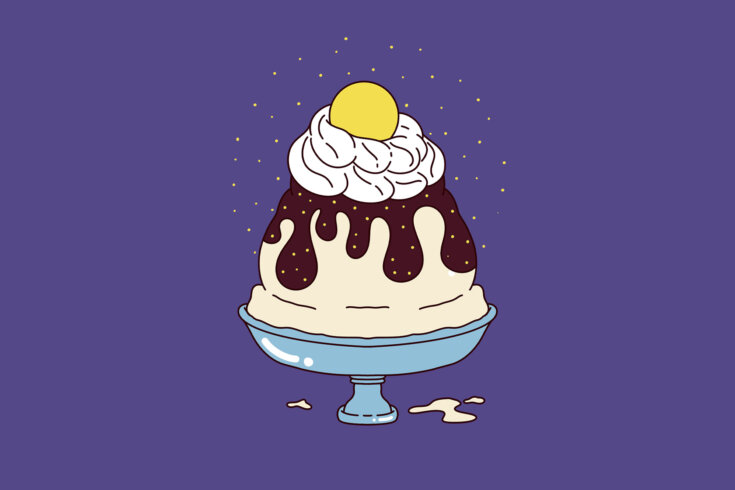
On the northeast side of Portland is a pastry shop called Pix Patisserie. During the early days of the pandemic, when Pix was struggling to respond to restrictions, the owner had the idea to install a pair of dessert vending machines in the front courtyard. Today, these semi-brutalist things are probably responsible for most of Pix’s sales. They’re accessible twenty-four hours a day. If you feel like it, you can go there just before dawn, feed a machine $12 (US), and watch the sun rise while eating a chocolate mousse contraption named—brace yourself—Un Fantôme, Un Couteau, Une Nuit.
Maybe there are better ways to spend your time. I doubt it, though.
There’s this annoying thing people sometimes do where they talk about something obviously virtuous as though it were a dirty little secret. My guilty pleasure? Well, sometimes, I do Pilates without even stretching first! This is awful; you should not associate with people who do this.
My guilty pleasure is eating garbage food in the middle of the night. Before we go any further, I should note that both parts of this predilection are equally vital. Eating garbage food at normal hours is just life; eating radishes at three in the morning is plainly sociopathic.
By garbage food, I don’t mean food that tastes bad (though, sometimes, if you find yourself in a highway-side truck stop because the only other option is whatever the gas station has under a flickering heat lamp, it is probably going to taste bad). Rather, I mean food that is bad for you. That dessert at Pix is as delicious as its pretentious name suggests; several blocks south, a late-night sandwich place called Devil’s Dill makes a red wine–braised beef that’ll drop you where you stand. No, the thing we’re talking about here isn’t quality, it’s damage—the life-shortening certainty, the Je sais absolument quoi of truly bad food.
When we were young, which is the only time you’re supposed to do this sort of thing, me and my college buddies would put that week’s student newspaper to bed and then promptly head for Denny’s. It was tradition. Some nights, we’d get the edition out the door so late that by the time we were done at Denny’s, it’d be full morning outside. There are two things I remember about those nights. The first is the feeling of absolute freedom, of being alive. The second is roughly twelve subsequent hours of spectacular digestive catastrophe.
I’m in my forties now. Every now and then, in shameless middle-age panic, I go on a fitness kick and end up watching those insufferable exercise influencer videos on YouTube. A number of them agree that if you want to get ripped—a word that sounds more violent and unpleasant the older I get—one cardinal rule is no food at night. This piece of advice reminds me that I should perhaps not be taking life advice from a shirtless, unnaturally shimmering twenty-something man whose instructional video was preceded by footage of an emu trying to sell me insurance.
There is, I suspect, something cultural about eating late. I come from the Mediterranean, where people tend to nap during the middle of the day and eat during the middle of the night. I’m also Muslim, and one of the most wondrous things about Ramadan in the old country was knowing that a lot of people were non-functional till sundown, that you could go get an ice cream sundae at two in the morning and it was perfectly normal. Advisable, even.
But there’s also, if I’m being honest, something insolent and petty about it. I have two young kids—most of my days don’t belong to me. Not that long ago, I spent what was probably twenty minutes but felt like three days playing a game my daughter invented called “pattern, horn.” It’s like rock, paper, scissors, except there’s only two things, pattern beats horn, and I’m not allowed to pick pattern.
But the late nights—the late nights are mine alone, and I’ll spend them however I damn well please. And what I please is to eat drive-thru tacos in a parking lot near a building that looks like the warehouse from Saw. I’m at peace with my decision. It’s everyone else who’s wrong.







